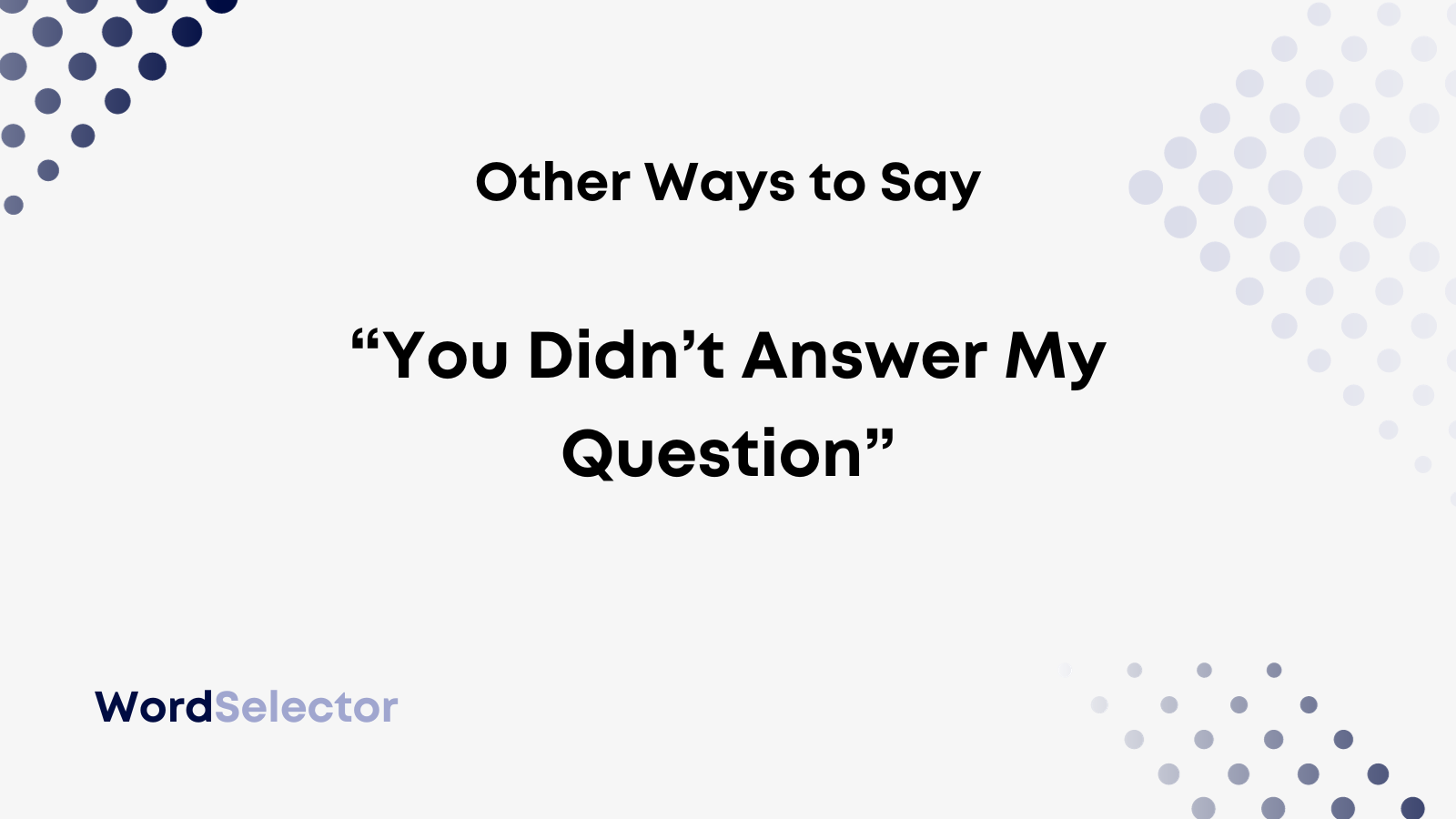Has someone just ignored or overlooked your question in an email?
Now, you’re wondering how to say “you didn’t answer my question” politely. After all, you don’t want to sound rude!
Well, you’re in luck!
This article has gathered some synonyms to show you what to say when someone doesn’t answer your question.
Other Ways to Say “You Didn’t Answer My Question”
- I’m still awaiting your response
- It seems you didn’t address my question
- I’m sure you didn’t mean to, but you overlooked my question
- My question seems to have been overlooked or unanswered
- I’m still in need of a direct answer
- My question may have been missed in the previous email
- My question remains unanswered
- I’m seeking a clear response
- You may have missed my question
- I’m still hoping for a reply to my question
- I am still waiting to receive a satisfactory answer
- My question still requires a response
KEY TAKEAWAYS
- “You didn’t answer my question” is a passive-aggressive phrase that shows someone ignored or avoided your question.
- “I’m still awaiting your response” works really well as a formal synonym to keep things respectful yet direct.
- “It seems you didn’t address my question” works well as an informal alternative to help you keep things more casual.
You should read on to learn how to say “you didn’t answer my question.” We’ll help you understand the best formal and informal options to cover all contexts.
The final section also explores whether it’s correct to say “you didn’t answer my question.” So, skip ahead if you’re ready to learn more about that.
I’m Still Awaiting Your Response (Formal)
If you’re wondering how to professionally say “you didn’t answer my question,” start with “I’m still awaiting your response.”
It’s great as a formal alternative, as it’s polite and respectful while letting the recipient know you need a reply from them.
It’s not as passive-aggressive as “you didn’t answer my question.”
Instead, it’s more bossy and direct. We recommend using it when emailing an employee to let them know you still expect an answer.
Generally, the phrase is most effective when you’re someone’s boss. It comes from a position of authority, so you need to use it when talking to people who work for you.
Feel free to refer to this email example as well:
Dear Hillary,
I’m still awaiting your response to my previous email. Please don’t keep me waiting for much longer, as I need to know your answer.
All the best,
Danny Hoseman
It Seems You Didn’t Address My Question (Informal)
You can use “it seems you didn’t address my question” as another way to say “you didn’t answer my question.” This time, it’s a more informal alternative.
But when might an informal phrase be more suitable?
Well, we recommend using it when emailing a colleague. It shows you’ve asked them a question relating to a team project, but you still haven’t heard their answer.
Generally, it’s a great way to encourage someone to reply. After all, it lets them know you’re still waiting for an answer, but you don’t blame them for potentially missing your question.
Here’s a great sample email to show you how it works:
Dear Tina,
It seems you didn’t address my question. I’m not mad, but I need your answer before I can advise the others!
Best,
Katie Sutton
Is It Correct to Say “You Didn’t Answer My Question”?
It is correct to say “you didn’t answer my question.” If you specifically asked someone a question that they overlooked or ignored, this is a great way to draw attention to it.
We recommend using this when emailing an employee. It’s quite an authoritative phrase, showing that you’re disappointed someone didn’t answer a question correctly.
It is not rude, but it is very passive-aggressive. We recommend only using it when you’re determined to get an answer out of someone.
Here’s an example showing you how to use it:
Dear Carla,
You didn’t answer my question. I appreciate that these are difficult times, but we need to be on the same page here.
Best regards,
William Howard
It’s best to try and be polite and respectful when dealing with someone who avoids your questions. The last thing you want to do is aggravate them.
That’s why the email example above is quite useful. It shows you how to remain polite and supportive, even if you still expect someone to reply to your original question.

